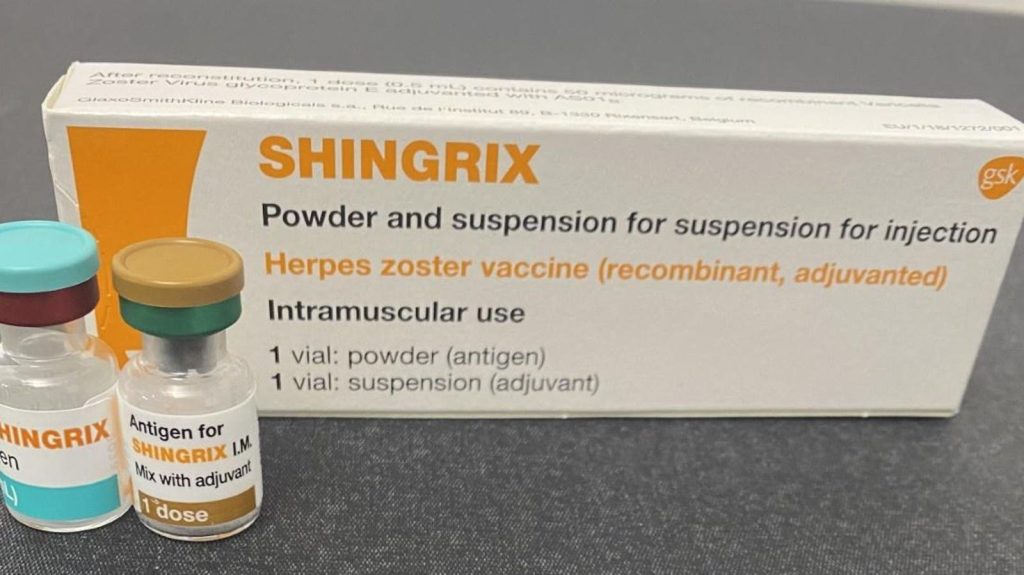A new recombinant shingles vaccine, Shingrix, appears to reduce the risk of dementia compared with the traditional shingles vaccine, a new large-scale study has found.
Shingrix (Shingles Vaccine (Recombinant, Adjuvanted)). (Credit: Whispyhistory / CC BY-SA 4.0)
Evidence from a team of scientists University of Oxford The new shingles vaccine has been shown to protect against dementia compared with the previous shingles vaccine. Both shingles vaccines have been shown to lower the risk of dementia compared with the influenza vaccine or the tetanus-diphtheria-pertussis (Tdap) vaccine.
Scientists studied the health of more than 200,000 people who received one of two shingles vaccines and found that the recombinant shingles vaccine, Shingrix, reduced dementia by at least 17% more than the older, now discontinued live shingles vaccine, Zostavax. They also found that Shingrix reduced dementia risk by 23-27% more than other vaccines for the disease. This translates to 5-9 months or more of dementia-free days.
This protective effect was seen in both sexes but was more pronounced in women.
Interestingly, after the live shingles vaccine, Zostavax, was introduced in 2006, some studies suggested that the vaccine may reduce the risk of dementia. Zostavax has since been discontinued in many countries, including the US and UK, in favor of the more effective vaccine, Shingrix. Unlike Zostavax, Shingrix is not a live virus vaccine. It is a recombinant vaccine made from parts of the virus. It is given in two doses, the second of which is given two to six months after the first.
Participants for this comparative study were identified during the switchover period between the two vaccines. This provided a unique opportunity to compare the risk of dementia six years after Shingrix with other similar groups who received Zostavax. Each group included more than 100,000 participants. The study also compared Shingrix with vaccines for other infectious diseases (influenza, tetanus, diphtheria, whooping cough).
“The scale and nature of this study makes these findings compelling and should encourage further research,” said Maxime Taquet, an NIHR clinical lecturer with an educational background in both clinical psychiatry and engineering, and lead author of the study.
“The findings support the hypothesis that shingles vaccination may prevent dementia. If tested in clinical trials, these findings could have major implications for older people, health services and public health.”
How does Shingrix prevent dementia?
“Infection with the varicella zoster virus may increase the risk of dementia, so inhibiting the virus with a vaccine may reduce this risk,” said co-author John Todd, professor of precision medicine at the University of Oxford and director of the Wellcome Centre for Human Genetics and the JDRF/Wellcome Diabetes and Inflammation Institute (DIL).
“Alternatively, vaccines also contain chemicals that may have other beneficial effects on brain health,” Todd added. These chemicals, called adjuvants, are designed to help the immune system respond strongly to the vaccine and develop a long-lasting immune response.
“The Shingrix vaccine contains a different, and possibly stronger, chemical adjuvant than previous vaccines.”
Various analyses have shown that these findings are strong, but further research is needed before any suggestions can be made that the shingles vaccine itself should be used to prevent or delay the onset of dementia.
“These findings are intriguing and encouraging,” said Paul Harrison, lead author of the study, Theme Leader at the NIHR Oxford Health Biomedical Research Centre and Group Leader at the Oxford Wellcome Centre for Integrated Neuroimaging.
Shingles diagnosis, medication and stethoscope.
Shingles is caused by the varicella zoster virus (VZV), which also causes chickenpox (a common childhood illness). After recovery, VZV can lie dormant in the nervous system for decades, but can reappear and cause shingles if the immune system weakens, or due to aging or stress.
Shingles is a serious, painful illness that can affect anyone over the age of 50. Most people recover from shingles within a year, but about one in five people suffer from post-herpetic neuralgia that can last for weeks, months, or years. These aftereffects can include vision loss or blindness (permanent), very severe persistent pain, and scarring.
For these reasons, the CDC recommends that adults over 50 years of age receive the Shingrix vaccine to prevent shingles and serious complications from the disease. Anyone who has had shingles or has previously received Zostavax can get the Shingrix vaccine. It’s also worth getting vaccinated if you’re not sure if you had chickenpox as a child.
The findings raise an intriguing question: especially in this age of “anti-vaccine” craze, could the public increase uptake of the Shingrix vaccine to prevent the dreaded shingles outbreak as well as reduce the risk of dementia?
“Given the large and growing number of people affected by dementia, anything that could potentially reduce the risk of dementia should be welcomed,” Dr Harrison said.
sauce:
Maxime Taquet, Quentin Dercon, John A. Todd, and Paul J. Harrison (2024). Recombinant shingles vaccine associated with reduced risk of dementia, Nature Medicine | Doi:10.1038/s41591-024-03201-5
©Copyright holder Girl Scientist | Organizer Forbes | Link Tree
social: blue sky | Counter Social | Gab | LinkedIn | Mastodon Science | Spoutible | Substack | thread | Tribell | tumbler | twitter


